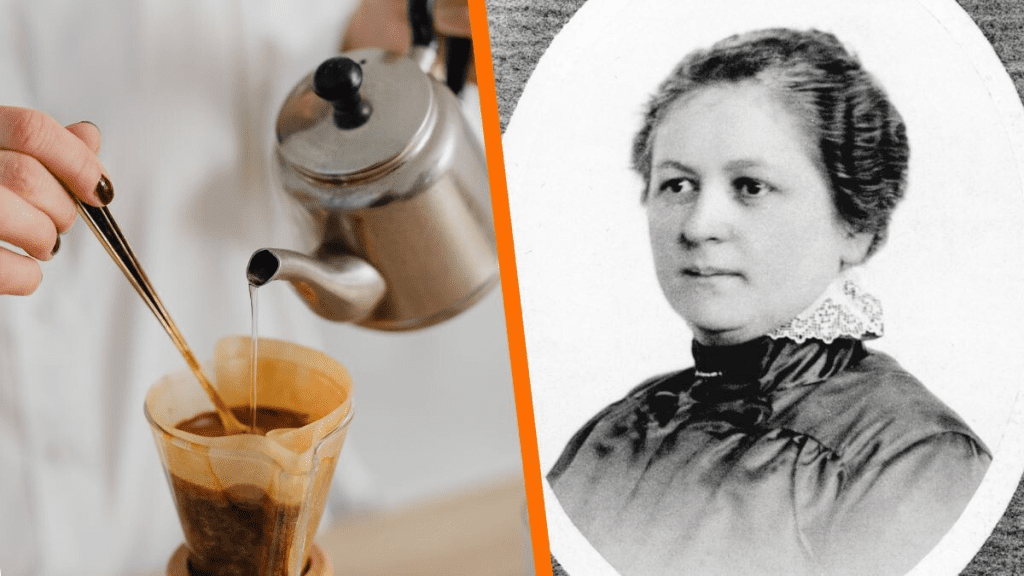Long before lattes and espresso machines became staples of modern kitchens, making coffee was a messy, bitter experience. Coffee drinkers in the early 1900s struggled with metal filters that allowed grounds to seep into their cup and left a gritty residue. It was a daily inconvenience that few questioned until a German housewife named Melitta Bentz decided enough was enough.
In 1908, driven by nothing more than a desire for a smoother brew and a cleaner pot, Melitta took a brass container, poked holes in the bottom, and lined it with her son’s blotting paper from school. She poured in ground coffee, added hot water, and let gravity do the rest. The result was a clean, flavorful cup of coffee with no grounds in sight. Without realizing it, she had just invented the world’s first disposable paper coffee filter.

From Kitchen Table to Business Empire
Melitta’s invention was more than just a personal solution. It was the beginning of a business that would grow far beyond her kitchen table. With only 72 pfennigs and the support of her husband Hugo, she registered her idea and founded a small company in Dresden, Germany.
At first, Melitta filters were hand-cut and sold at local markets. It didn’t take long for word to spread. Shoppers were impressed by the convenience and taste her filters delivered. As the demand increased, so did production. In just a few years, what began as a household hack became a full-fledged family business.

Shaping the Modern Coffee Experience
Melitta Bentz wasn’t just an inventor; she was a visionary. She didn’t stop after her initial success. She continued to improve her product and expand her company’s reach. The Melitta brand grew steadily through the decades, weathering two world wars and adapting to changing consumer habits.
Video:
Melitta Bentz: Inventor of the Paper Coffee Filter
Her innovation helped shape the modern coffee culture we know today. Before automatic machines and pod systems, millions relied on the drip-brewing method that her filter made possible. Her design simplified coffee preparation, ensured consistency, and eliminated the need for complex cleaning. Most importantly, it allowed people around the world to enjoy coffee without bitterness or sediment.
A Legacy Led by Family and Values
Melitta Bentz was ahead of her time, not just in invention, but in business ethics. She valued her employees and created a company culture that prioritized fair treatment, health benefits, and a positive working environment all unusual practices in early 20th-century industry.
Even after her passing in 1950, her values lived on through her family. The company stayed privately owned and family-led, allowing it to grow organically without sacrificing its core identity. Today, Melitta Group employs thousands of people and produces billions of filters each year, with products found in more than 50 countries.

Why Her Story Still Inspires
What makes Melitta Bentz’s story so remarkable is its simplicity. She wasn’t a scientist or an engineer. She was a homemaker who saw a problem and had the courage to solve it. Her story reminds us that innovation doesn’t always come from laboratories or boardrooms. Sometimes, it starts with a small moment of frustration and a bit of creative thinking at the kitchen counter.
Video:
What Makes Pour-Over Coffee Better Than Other Brewing Methods?
Her contribution may seem modest compared to modern technology, but her invention changed everyday life for millions. It made coffee better, easier, and more enjoyable and continues to do so over a century later.
One Filter, A World of Change
Today, the name Melitta is synonymous with quality coffee filters. But behind every box is the story of a woman who dared to ask if there was a better way. Her curiosity and determination gave birth to a product that is still in daily use around the world.
Next time you brew your morning cup and watch the water gently filter through the paper, take a moment to remember Melitta Bentz. With just school paper, a brass pot, and a bold idea, she gave the world a cleaner cup and a lasting legacy.



